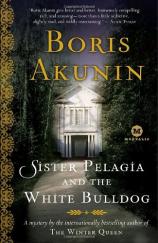Sister Pelagia and the White Bulldog
Review
Sister Pelagia and the White Bulldog
Boris Akunin is a well-regarded Russian author of suspense fiction,
heretofore known for his Fandorin series, which concerns a
part-James Bond, part-Hercules Poirot creation who nonetheless is
strikingly original. SISTER PELAGIA AND THE WHITE BULLDOG marks the
beginning of a new direction for Akunin and fittingly introduces
Mortalis, a new imprint of literary mystery and suspense fiction
for Random House.
We quickly learn from the unnamed, omnipresent narrator that Sister
Pelagia is a sleuth in nun's habit, wishing to devote her life to
God yet feeling stifled by the requirements of the order and by the
role of women in early 20th century Russia. In addition, she is
quite adept at solving mysteries, a skill that she hides from all
except her supervisory bishop, who keeps her abilities a secret not
only to preserve the good sister's customary role but also to keep
her in reserve as a secret weapon in the political skirmishes that
were the hallmark of the time.
The bishop generally has his hands full, what with an inspector
from the Holy Synod coming to meddle in local affairs, the gruesome
discovery of two decapitated bodies, and the bishop's aunt being in
a terrible state as a result of the baffling death of one of her
white bulldogs, a special breed that she and her late husband had
nurtured through generations. The perpetrator of the canine murder
is quickly determined, even if the motive isn't, and the unforeseen
nexus that connects this and other events is slowly but surely
sorted out in a climactic courtroom scene in which the good sister
has a starring role.
It should be noted that Russian literature tends to be the
antithesis of, say, a James Patterson work --- why use one word
when pages will do? --- and occasionally, as even Akunin notes with
a nod and a wink through his anonymous narrator, things seem to
wander off track. All is revealed in good time, however, and along
the way Akunin drops nuggets of dry, subtle humor amidst social and
political commentary. Those who take their mysteries with great
spoonfuls of explosions and karate may find this book wanting
(though it does, particularly near the end, have its moments), and
there is enough political intrigue and metaphor to provide a
satisfactory feast.
Lovingly translated by Andrew Bromfield, SISTER PELAGIA AND THE
WHITE BULLDOG is a welcome debut of a new series that hopefully
will give Akunin the wider visibility in this country that his work
deserves. And let's give some kudos to Random House as well for its
brave launch of Mortalis. We'll happily look for more.
Reviewed by Joe Hartlaub on January 23, 2011




